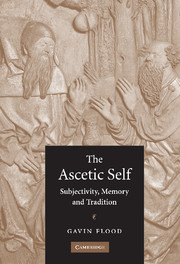Book contents
- Frontmatter
- Contents
- Preface
- Acknowledgements
- 1 Setting the parameters
- PART I THE ASCETIC SELF IN TEXT AND HISTORY
- 2 The asceticism of work: Simone Weil
- 3 The asceticism of action: the Bhagavad-gītā and Yoga-sūtras
- 4 The asceticism of action: tantra
- 5 The asceticism of the middle way
- 6 The asceticism of the desert
- 7 The asceticism of love and wisdom
- PART II THEORISING THE ASCETIC SELF
- Bibliography
- Index
3 - The asceticism of action: the Bhagavad-gītā and Yoga-sūtras
Published online by Cambridge University Press: 16 November 2009
- Frontmatter
- Contents
- Preface
- Acknowledgements
- 1 Setting the parameters
- PART I THE ASCETIC SELF IN TEXT AND HISTORY
- 2 The asceticism of work: Simone Weil
- 3 The asceticism of action: the Bhagavad-gītā and Yoga-sūtras
- 4 The asceticism of action: tantra
- 5 The asceticism of the middle way
- 6 The asceticism of the desert
- 7 The asceticism of love and wisdom
- PART II THEORISING THE ASCETIC SELF
- Bibliography
- Index
Summary
tyaktvā lokāṃśca vedāṃśca viṣayāṇīndriyāṇi ca /
ātmanyeva sthito yastu sa yāti paramāṃ gatim //
Abandoning the worlds, scriptures, senses and their objects, he who is established in the self goes to the supreme abode.
Nāradaparivrājakopaniṣad 4.1In the margins of her copy of the Bhagavad-gītā Simone Weil pencilled her French translation by a passage, ‘I am the doer, the agent … and yet I am the changeless one who does not do or act.’ Although this is Krishna speaking, for Weil non-acting action (l'action non-agissante) is an ideal to be achieved. We act as we must through necessity, as Arjuna must fight in the battle of Kurukshetra, but must remain detached from action and its results if we are to achieve wisdom. So, while the ascetic self at one level is characterised by will, agency and resistance, for Weil a higher understanding is that the self is devoid of agency and the ‘I’ (‘le je’) is empty, acting only because driven by necessity. In this chapter I shall begin to develop the performance of this ambiguity of passivity and activity in the South Asian context.
Our journey will begin with Brahmanical conceptualisations of the self, showing how the ambiguity of the self is at the heart of this discourse, and moving on to show how the ascetic self performs the memory of tradition, that is, internalises the tradition (and so looks to the past) and its goals (and so looks to the future).
- Type
- Chapter
- Information
- The Ascetic SelfSubjectivity, Memory and Tradition, pp. 64 - 94Publisher: Cambridge University PressPrint publication year: 2004



